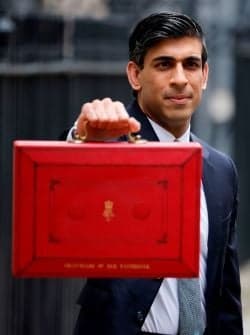Final two candidates battle over tax plans
Former Chancellor Rishi Sunak and current Foreign Secretary Liz Truss are the final candidates vying for the Conservative Party leadership – and Prime Minister vacancy – after Conservative MPs spent the past two weeks whittling down the contenders. It is now down to the more than 150,000 Conservative Party members to choose their preferred candidate, with the winner to be announced on 5 September.
Tax is at the centre of the contest. Truss promises an emergency Budget to cut taxes, claiming Sunak has pushed Britain in the ‘wrong direction’ on taxation. Sunak insists he ‘will govern as a Thatcherite’ after facing repeated criticism from the right of the party for wanting to hold off on tax cuts until after inflation is under control.
The candidates’ plans in brief
Rishi Sunak

- Cut taxes, but only once inflation has been brought under control - a matter of ‘when, not if’, he claims.
- No plan to deviate from his increase to National Insurance contributions (NICs), freezing of income tax thresholds, and tax cut by raising the threshold at which workers begin to pay NICs.
- No suggestion he will alter his cuts to duties on alcohol and fuel, and some increases to benefits, but no indication he will go further.
- Go ahead with increase in the main rate of corporation tax, from 19 per cent to 25 per cent, from April 2023 for big companies (those making annual profits more than £250,000).
- Sunak, while he was still Chancellor, indicated that he intended to announce some ways to increase investment allowances in the autumn Budget.
- Public service spending would be rising over the remainder of the parliament, though at a considerably less generous pace than originally intended due to higher inflation, and with almost all departmental budgets still considerably down in real terms on their 2010 levels.
Liz Truss
- Cancel increase in the main rate of corporation tax, from 19 per cent to 25 per cent, from April 2023. (Cancelling the increase would cost £17 billion a year, according to government estimates.)
- Reverse the increase in NICs rates (cost of £13 billion per year, says IFS).
- ‘Review taxation of families to ensure people aren't penalised for taking time out to care for children/elderly relatives’. According to media reports the proposal the review would focus on is making more or all of the income tax personal allowance (rather than just 10 per cent of it, as now) transferable between members of couples. Wording suggests this might be restricted to those with caring responsibilities.
- ‘Temporary moratorium on the green energy levy’ – though she has not specified when the temporary moratorium would begin and end, exactly which levies on energy bills would be suspended (such as whether it would include the climate change levy on businesses’ energy use as well as the various levies that apply to households too), and what would happen to the subsidies for renewable energy generation that some of the levies fund.
- This package of tax cuts would cost more than £30bn, says the IFS, and without counteracting measures this would likely result in the current fiscal rules being broken.
- Truss has also indicated that she would like to see government debt put ‘on a longer-term footing’. This seems to refer to locking in long-term interest rates and increasing the average maturity of government debt, if such longer-term debt could be easily placed, suggests the IFS.
Public spending
Outside defence spending the candidates have been less forthcoming about their intentions for public spending. Truss is thought likely either to make cuts to overall spending plans or to change the fiscal rules. She has committed to a Spending Review, though without an explicit intention to change overall spending in any particular direction.
When the spending review was announced in October, the expectation was that inflation would peak at around four per cent. It is now set to peak at 11 per cent and stay higher for longer. Those plans were also built on an assumption of pay awards between two and three per cent per year; public sector workers have now been offered pay increases averaging around five per cent.
The IFS says: “Whoever is in office in the autumn will have to make a choice between topping up spending plans to shore up public services, or requiring any additional costs to be met from within existing budgets. The former would eat into the fiscal headroom available for tax cuts; the latter would mean a deterioration in the quality of public service provision.”
Personnel rumours
Neither candidate has made any commitment to appoint particular individuals to key cabinet positions. However…
An article in Daily Telegraph suggests Prime Minister Sunak could make former levelling up secretary Michael Gove his Chancellor, with Kemi Badenoch mooted as a possible Chief Secretary to the Treasury. Current Financial Secretary Lucy Frazer and Treasury Committee chair Mel Stride are strong Sunak supporters (Stride was chief whip for the parliamentary stage of his campaign) and could well be in line for promotions. The Telegraph mentions Stride as another possible Chief Secretary under Sunak.
The same Telegraph article suggests Simon Clarke, the Chief Secretary to the Treasury, is a possible Chancellor under Truss, although a more likely candidate would be Kwasi Kwarteng, the current business secretary.
Current Chancellor Nadhim Zahawi is thought unlikely to remain as Chancellor under either contender. The Telegraph suggests he might be moved to another business-facing job such as trade secretary or business secretary.
Neither Sunak nor Truss is thought likely to give the other a Cabinet job at the end of the contest – or to accept such a job if it were offered.
By Hamant Verma, CIOT Senior External Relations Officer
